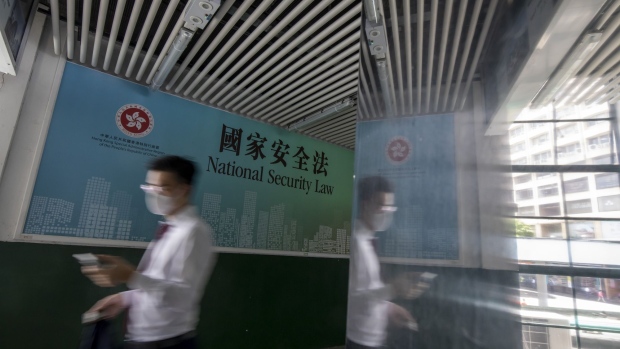Jun 15, 2021
Hong Kong to ‘Engage’ Filmmakers Spooked by Censorship Rules
, Bloomberg News

(Bloomberg) -- Hong Kong will engage the local film industry to ease concerns about guidelines allowing national security bans on movies, the city’s leader said, saying most themes wouldn’t violate government red lines.
While Hong Kong Chief Executive Carrie Lam defended the censorship rules announced Friday, she told a news briefing Tuesday that Commerce Secretary Edward Yau would seek to reassure the film-making industry. The measure allows censors to ban films with content that could be interpreted as endorsing violations of the national security law imposed by China last year.
“He will engage the industry practitioners to assure them of what we are talking about it in terms of not undermining national security,” Lam told reporters at a regular briefing ahead of a meeting of her advisory Executive Council. “But one has to accept that rights and freedoms, including the freedom of expression, are not without restrictions.”
The rules could have a big impact on Hong Kong, which for decades was one of Asia’s leading movie-making hubs, generating hit films and producing famous directors and global movie stars. Although the former British colony is guaranteed freedom of speech, authorities have so far used the vaguely worded security law to impose limits on what political positions people can take.
Hong Kong to Start Censoring Films on National Security Grounds
Asked about the impact on politically charged films like the police thrillers “Cold War” or “Infernal Affairs,” Lam said “we need to have a lot discussion” about what themes would run afoul of the law. “I believe that most of the films will not be violating this red line,” Lam said.
Lam and other Chinese officials have repeatedly said the security law would affect only “an extremely small minority” of people. The government has so far launched prosecutions of more than 100 people under the law, including much of the local Legislative Council’s former pro-democracy opposition.
A move toward China-style censorship in Hong Kong could have broader implications, since the city hosts regional offices for many international news organizations. Authorities have also recently moved to restrict access to public information, including the important Companies Registry, and have launched an overhaul of public broadcaster Radio Television Hong Kong, which has seen some hard-hitting programs and episodes canceled.
China’s Expanding Toolbox to Quell Hong Kong Dissent: QuickTake
Lam also responded Tuesday to criticism from some pro-establishment lawmakers of the Gay Games, a LGBTQ+ sporting event founded in San Francisco in 1982. After one lawmaker suggested the city should do more to support the games, another legislator urged the administration to avoid the event’s “dirty money,” according to the South China Morning Post newspaper.
“It was much regretted that in the course of discussing over this question in the Legislative Council that some individual members have become a bit emotional in expressing their view,” Lam said. “I certainly -- personally and as chief executive -- do not condone those sort of remarks by individuals, which will unnecessarily divide society and even raise hatred among certain sectors in the community.”
©2021 Bloomberg L.P.





